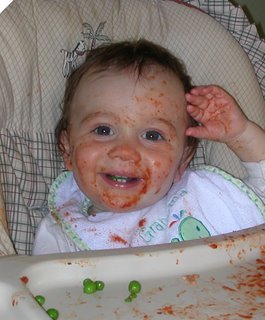 Food and eating constitute a significant chunk of our daily routine. There is breakfast, followed by the morning snack, lunch, afternoon snack, a pre-dinner snack, and then dinner. With a toddler who is just learning how to eat and also enjoys playing with her food, this facet of our lives takes quite a chunk of time--I'd approximate we spend between two and a half and three and a half hours a day just eating. That is 21% to 29% of the day. All this time gives me ample opportunity to reflect on our family's diet.
Food and eating constitute a significant chunk of our daily routine. There is breakfast, followed by the morning snack, lunch, afternoon snack, a pre-dinner snack, and then dinner. With a toddler who is just learning how to eat and also enjoys playing with her food, this facet of our lives takes quite a chunk of time--I'd approximate we spend between two and a half and three and a half hours a day just eating. That is 21% to 29% of the day. All this time gives me ample opportunity to reflect on our family's diet.I spend a lot of time planning Franny's meals, introducing new foods, and attempting to balance all her nutritional needs, including the standard food groups, EFAs--especially omega 3s, and both plant and meat protiens. I'm not trying to be a fanatic--in the short run, I just want her to be as healthy as possible; in the long run, I want her to have a solid understanding of how nutrition impacts the body so she can have control over her health and hopefully, a postive body image, which is particularly hard for girls these days.
So far, Franny has been very easy, she eats brown rice, whole grain pastas, every fruit and vegetable, soy, and chicken. And she eats with extreme enthusiasm. She also has had minimal interest in sweets like cake or cookies, although I realize this will change.
So, it makes me wonder, if I am really committed to Franny's nutrition, should I be providing her with 100% organic foods? I would say that organics make up about 30% of our diet. I would like to do more, but it is very difficult to accept the cost. For example, we consume 5 1/2 pounds of bananas a week. To buy organic would add up to $2 a week, or just over $100 a year. That figure seems rather minimal, but that is just bananas. Chicken would represent an additional $18 a week or $936 a year. It significantly adds up, no question!
But the concern is Franny's health. A 2003 University of Washington study found that children who ate a diet of organic food had a level of pesticides in their bodies that was six times lower than children who ate a diet of conventionally produced food. Animal testing has indicated that pesticides can cause permanent changes in brain chemistry that may lead to anything from behavioral disorders to learning disabilities to long-term damage to the brain and nervous system. Pesticides may also block a child's absorption of nutrients that are important for healthy growth and development. Babies and young children may be especially vulnerable to pesticides because their organs and nervous system are at a crucial stage of development, because they may absorb pesticides more easily and break them down less easily, and because they eat more food relative to their body weight than adults. And lastly, a 2003 study at the University of California at Davis found that organic fruit has up to 58 percent more antioxidants (which may help prevent heart disease and cancer) than non-organic fruit.
So, remains the challenge--the balance between healthy eating and all the other needs we have. Currently, I have no solution, but its just something I think about--constantly.

No comments:
Post a Comment